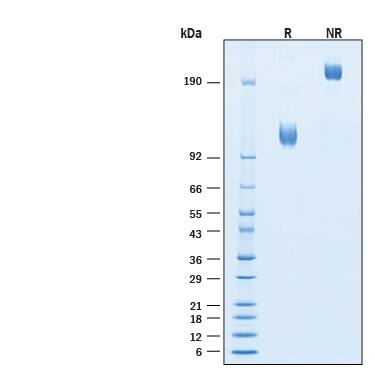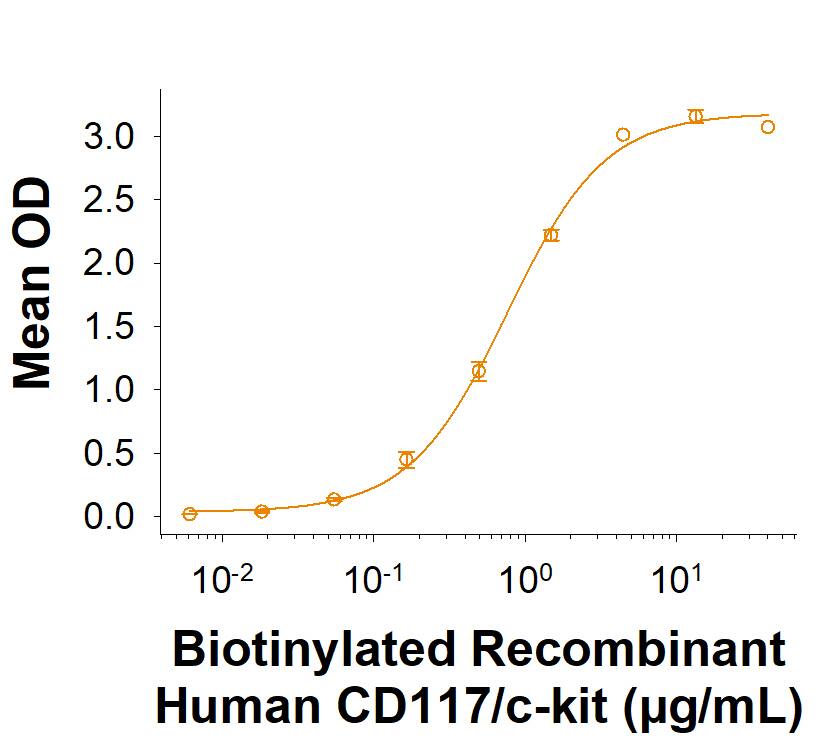Recombinant Human CD117/c-kit Fc Biotinylated Protein, CF
R&D Systems, part of Bio-Techne | Catalog # BT10961
Fc Chimera

Key Product Details
- R&D Systems CHO-derived Recombinant Human CD117/c-kit Fc Biotinylated Protein (BT10961)
- Quality control testing to verify active proteins with lot specific assays by in-house scientists
- All R&D Systems proteins are covered with a 100% guarantee
Source
CHO
Structure / Form
Disulfide-linked homodimer
Biotinylated via amines
Biotinylated via amines
Conjugate
Biotin
Applications
Bioactivity
Product Specifications
Source
Chinese Hamster Ovary cell line, CHO-derived human CD117/c-kit protein
| Human CD117/c-kit (Gln26-Thr520) Accession # P10721.1 |
IEGRMD | Human IgG1 (Pro100-Lys330) |
| N-terminus | C-terminus |
Purity
>95%, by SDS-PAGE visualized with Silver Staining and quantitative densitometry by Coomassie® Blue Staining.
Endotoxin Level
<0.10 EU per 1 μg of the protein by the LAL method.
N-terminal Sequence Analysis
Gln26
Predicted Molecular Mass
82 kDa
SDS-PAGE
110-120 kDa, under reducing conditions.
Activity
Measured by its binding ability in a functional ELISA.
Biotinylated Recombinant Human CD117/c-kit Fc Chimera (Catalog # BT10961) binds Recombinant Human SCF/c-kit Ligand (Catalog # BT-SCF) with an ED50 of 0.400-4.00 μg/mL.
Biotinylated Recombinant Human CD117/c-kit Fc Chimera (Catalog # BT10961) binds Recombinant Human SCF/c-kit Ligand (Catalog # BT-SCF) with an ED50 of 0.400-4.00 μg/mL.
Scientific Data Images for Recombinant Human CD117/c-kit Fc Biotinylated Protein, CF
Biotinylated Recombinant Human CD117/c-kit Fc Chimera Protein Binding Activity.
Biotinylated Recombinant Human CD117/c-kit Fc Chimera Protein (Catalog # BT10961) binds Recombinant Human SCF/c-kit Ligand (BT-SCF) with an ED50 of 0.400-4.00 μg/mL.Biotinylated Recombinant Human CD117/c-kit Fc Chimera Protein SDS-PAGE.
2 μg/lane of Biotinylated Recombinant Human CD117/c-kit Fc Chimera Protein (Catalog # BT10961) was resolved with SDS-PAGE under reducing (R) and non-reducing (NR) conditions and visualized by Coomassie® Blue staining, showing bands at 110-120 kDa and 220-240 kDa, respectively.Formulation, Preparation and Storage
BT10961
| Formulation | Lyophilized from a 0.2 μm filtered solution in PBS with Trehalose. |
| Reconstitution | Reconstitute at 250 μg/mL in water. |
| Shipping | The product is shipped at ambient temperature. Upon receipt, store it immediately at the temperature recommended below. |
| Stability & Storage | Use a manual defrost freezer and avoid repeated freeze-thaw cycles.
|
Background: CD117/c-kit
References
- Roskoski, R. et al. (2005) Bioche. & Biophy Res Comm. 338:1307.
- Bashamboo, A. et al. (2006) J. Cell Sci. 119:3039.
- Kimura, Y. et al. (2011) PLoS ONE 6:e26918.
- Lennartsson, J. and Rönnstrand L. (2012) Physiol Rev. 92:1619.
- Caruana, G. et al. (1999) Oncogene 18:5573.
- Lemmon, M.A. et al. (1997) J. Biol. Chem. 272:6311.
- Jamur, M.C. and C. Oliver (2011) Front. Biosci. (School Ed.) 3:1390.
- Huang, B. et al. (2008) Blood 112:1269.
- Krishnamoorthy, N. et al. (2008) Nat. Med. 14:565.
- Wang, C.-H. et al. (2007) Arterioscler. Thromb. Vasc. Biol. 27:540.
- Kanellakis, P. et al. (2006) Cardiovasc. Res. 70:117.
- Sartini, S. et al. (2011) Curr. Med. Chem. 18:2893.
Long Name
Stem Cell Factor Receptor
Alternate Names
c-kit, CD117, ckit, KIT, PBT, SCF R, SCFR
Gene Symbol
KIT
Additional CD117/c-kit Products
Product Documents for Recombinant Human CD117/c-kit Fc Biotinylated Protein, CF
Product Specific Notices for Recombinant Human CD117/c-kit Fc Biotinylated Protein, CF
For research use only
